
Smile! Its a boy! Cut the umbilical cord, for he is 24.
After my travels i have found many homes in this world. I hope this blog can show some of that... This blog is dedicated to ross who has been pestering me to get pictures to him
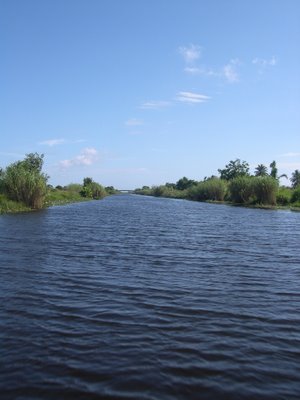
The canal is also busy. The long dugout canoes slowly make their way bearing heavy loads of pineapples, sugar cane, and wood. They are so heavily laden that the canoes are only an inch off the water; but, the experienced rowers, with their bulging shoulders and muscular arms, never make a mistake. As the sun sent her beaming rays down upon us and turned my pale white legs to a crisp brown, we departed from the lazy sea-side town of Mananjary and headed up the Pangalana.

Our destination was Adara, a village two hours by motorboat from Mananjary. Rich had come to teach at a large woman's conference and I had come along for the adventure. We passed through the countryside quickly; our motorboat was fast. The people in canoes looked with frightened faces as we passed, our large wake sometimes spilling water into their low canoes. The canal opened up into a large lake and then withered into a wide, brown, and windy river. The name I can neither pronounce nor spell. I felt like Marlow in Heart of Darkness, traveling deeper into the wild country, a place that I do not know. On the banks of the river, the naked boys swimming would stare and the ones brave enough would wave at us. Small huts topped the low hills. Skulls were not staked outside, but there was a sense of a culture untouched, different, and wild. These huts had probably been built the same way for centuries. This boat had just taken me back in time, to a village hidden from the world.

Adara is rather large village, placed on top of a steep hill that rises from the murky river. From the center of the village, you can look upon the surrounding area: on one side, the wide river cutting its way through dense green forest, and on the other, bare rolling hills. The village itself is monotonous and bland. The one-room houses are built with wood planks and posts. The roof is thatched with dried banana leaves. Everything is brown and grey-- the earth, the wood, the dried-banana leaves, the smoke, the people. The ground has been stripped of everything green.

Adara is a dull looking community but it is surrounded by a fertile countryside. Thick clusters of bananas hung over the paths. Mangos, litchis, and jack fruit could be found on trees scattered around the village. 
The people were very kind to us -- always giving though they had such limited resources. They lived simple lives. Most of the men either fished in the river or worked in the rice fields. The women stayed at home laboring at making meals, taking care of their numerous kids, or also working in the rice fields.

The kids ran around gleefully and were always playing games with each other. A lot of them were dressed in what looked like a dirty pillow case with a slit in the top for the head. While it was sad to see them dirty, having bulging stomachs, and missing many teeth (even at this early age, most of their teeth were rotten), they were very happy. They had many other children to play with and made use of whatever they had.

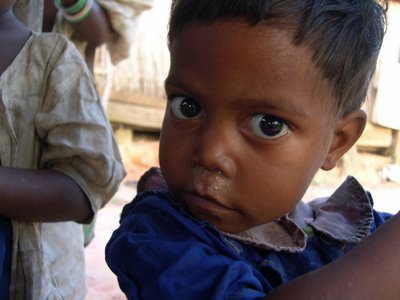
A village two hours up the Pangalany, with nothing except three churches to attract any visitors, does not see many foreigners (or vaza as we are so often called). And if they do get any, they are usually not young, like me, or bringing fancy equipment to show them movies each night, like Rich. Rich and I, then, were the talk of the town...er, village. As we sat exhausted from the trip, an endless line of people crammed through the small house to shake our hands. I think I shook every persons hand in that village at least once, some I know I did twice. I caught them returning again and acting like they just met us.

When we ate dinner, kids looked in through the windows and observed us. When I sat down outside, people sat down all around me and watched me. When I went for walks, people followed me. I got the feeling they did not see people like me much. Not much at all.


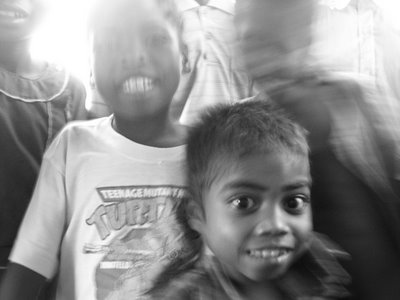
On our second day, the church had a baptism. I had been appointed the camera man for the occasion and stood in a boat in the river to shoot. The bank of the river, going up to Adara, is very steep and the whole village had collected on it. While the individuals were swimming out to the four pastors to be baptized, the rest of the people were on the bank singing. It was a wonderful sight to see and hear -- the people dancing with their colorful clothes, the wonderful voices and harmonies of the Malagasy, and the 45 people being baptized.

Here in Madagascar, it is common for people to live in captivity. Being bound to ancestors or possessed by demons is a frequent occurrence. Baptism, when the person declares that he is owned by Christ, is a time when many demons fight against Christ. Rich had warned me about this; but, no matter how much you hear, study, or read about demons, it does not prepare you for seeing one. As I was filming the baptism one woman who was obviously possessed, refused to be baptized. The pastors talked to her, and she started screaming out, refusing Jesus Christ. Suddenly she became violent, thrashing in the water and trying to hit the pastors. I do not remember what I was doing. I know I was frozen to my spot, half of me scared out of my shoes and my other half amazed. It took three men to subdue her and they prayed over her. She went limp like she was unconscious, and her eyes had rolled to the back of her head. It took several minutes before she had settled down, had been revived, and was finally baptized, professing the name of Jesus Christ. By the time all 45 people had been baptized, seven of them had demons cast out. The light shines in the darkness.

Each night we had a very good but simple dinner in the mayor's house. Many of us were crammed around table, eating by candlelight. It ever ceases to amaze me how God works in the lives of these people. While they might lack money, possessions, and a nice cashmere sweater, they make up for it by their faith. One night, Jean Paul, a local pastor, told his story to Rich and me. Jean Paul is short like most Malagasy and has a light complexion. He has a kind face that draws you to him and his voice, soft but firm, catches your ear. At the age of 16 Jean Paul became a Christian when he was told about Christ at a Christian camp. He had heard the verse that 'You and your family shall be saved.' He could not get that verse out of his head and decided he wanted to give his life to Christ, in hope that his family might also be saved. He grew up in a village not unlike Adara. He was the only Christian and his family was embarrassed by him. His father was the chief witch doctor.
God soon worked through him, though. His sister, soon after he devoted his life to Christ became very sick.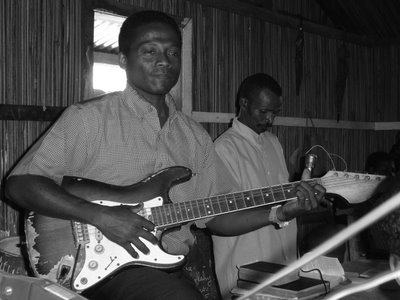
The witch doctors performed everything they could and yet, nothing happened. In fact, her state worsened and she soon appeared dead. They let Jean Paul see her and said he could try whatever he could. Jean Paul knew nothing to do and sat next to his sister crying and praying. He did not pray for her to be healed. He did not ask for God to raise her up but God did. After a half an hour, his sister was revived and she quickly recovered. His father handed Jean Paul all of his witch doctor instruments which were burned and became a Christian. The village was astonished and many realized the true power of Christ. The light shines in the darkness.
 Rich teaching
Rich teaching
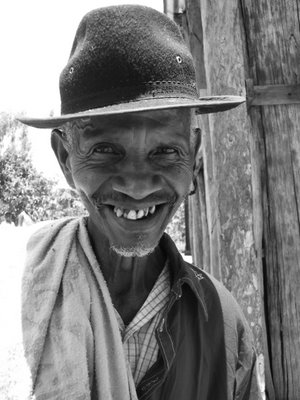 A local king
A local king
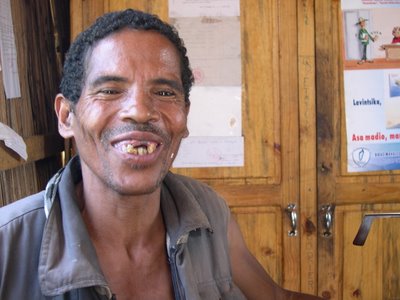 Government Secretary for Andara
Government Secretary for Andara
The rest of time at Adara went by quickly. Rich helped marry 13 couples. At the feast afterwards, I ate with the local kings. Each night we showed a video. Before I knew it, I was packing up and loading our boat again. Someone that morning had attempted to steal the boat, it drifted down the river before we found it. Another pastor, who started the motor again, was cut in the foot when the motor came off the boat, flew up in the air and then sunk in the water. We left later than expected and arrived much later than we expected in Mananjary. A few miles away we ran out of fuel and we had to make a sail out of a tarp and bamboo we found in the water. We made our way back down the Pangalany, slowly this time. The people in the canoes laughed and snickered at us now when they saw a motor boat with vaza with no gas. I had never gone so lazily down a river before and was surprised at how much I enjoyed it. I could see Rat asking me in surprise, "What have you been doing, then?"

